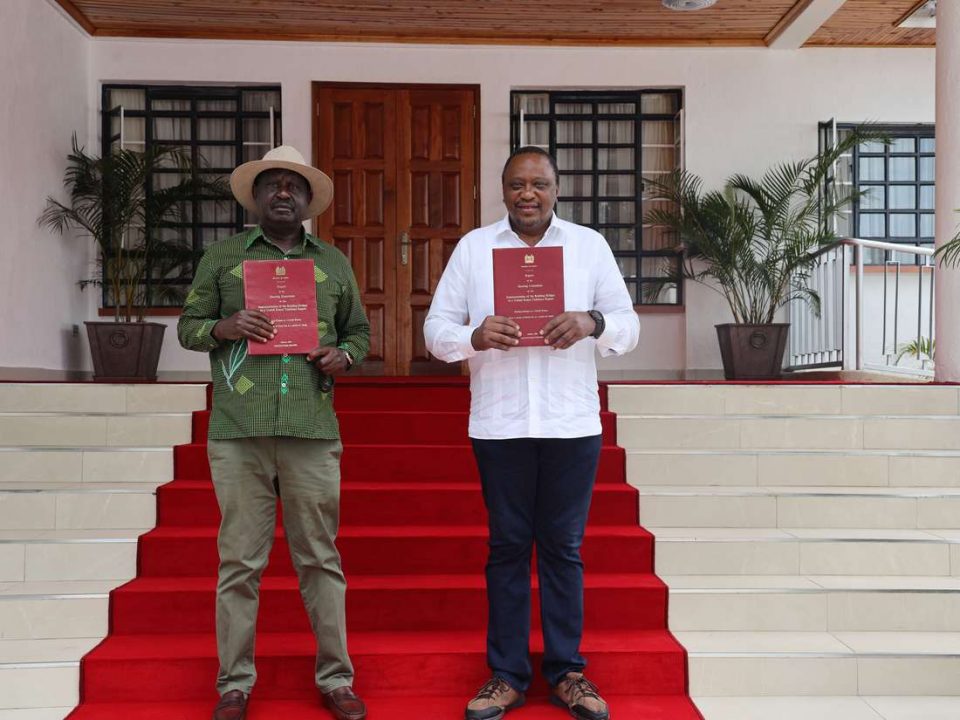Columnists
Make E-procurement system stronger
Friday November 06 2020
President Uhuru Kenyatta and former Prime Minister display a copy of BBI Report during the presentation at Kisii State Lodge. PHOTO | PSCU
Summary
- The report has proposed amendments to the Constitution — from Chapter Two to the last one.
- Of interest to supply chain professionals are Chapter Six on leadership and integrity, Chapter Thirteen, Chapter Fourteen and Chapter Fifteen on public service, national security agencies and commissions and independent offices.
- E-procurement will increase transparency, facilitate access to public tenders, reduce direct interaction between procurement officials and companies, increase outreach and competition, and allow for easier detection of irregularities and corruption.
The report of the Building Bridges Initiative (BBI) reforms taskforce has elicited debate on various issues, ranging from its constitutionality to whether Kenya needs it.
The report has proposed amendments to the Constitution — from Chapter Two to the last one.
Of interest to supply chain professionals are Chapter Six on leadership and integrity, Chapter Thirteen, Chapter Fourteen and Chapter Fifteen on public service, national security agencies and commissions and independent offices.
RIGORUOUS AUDITS
It proposes that these institutions should be accountable to the people of Kenya, have internal accountability systems, carry out rigorous audits that inquire into value for money and ensure that sound principles of public finance management apply to every arm of government and every public institution and facilitate, promote and enable ethical conduct and responsibility in public resource management.
The report recommends that the Public Procurement and Asset Disposal Act be reviewed to obligate accounting officers to ensure that procurement of goods, works and services is done transparently and with strict adherence to the approved procurement plans and that money should be available for payment of goods or services being procured. This sounds like an excellent and welcome idea.
However, for this to be achieved, public institutions need an integrated E-procurement system that will not only allow audit trails but also ensure that procurement processes are audited electronically.
E-procurement will increase transparency, facilitate access to public tenders, reduce direct interaction between procurement officials and companies, increase outreach and competition, and allow for easier detection of irregularities and corruption, such as bid rigging schemes.
In Ukraine, “ProZorro” Ukraine — a hybrid electronic open source government E-procurement system — has generated huge savings for the public purse, improved the quality of public service delivery and helped in economic growth of the country.
According to a study done by OECD (Organization for Economic Co-operation and Development) the implementation of a national E-procurement system in South Korea has brought about a notable improvement in the transparency and integrity of public procurement administration.
In Kenya, the integrated financial management and information system (IFMIS) was first launched in 2003.
IFMIS interlinks planning, budgeting, expenditure management and control, accounting, audit and reporting. It has promoted transparency, accountability and responsiveness of public financial resources.
It has enabled efficient resource allocation, improved management information for decision making, established effective links between key players in accounting and financial management, improved financial controls by making available reliable and timely financial information, and improved accounting, recording and reporting through timely, accurate financial data provision.
Despite the strides made so far, many government institutions still advertise for contracts online through the E-tendering platform but receive tenders of their proxies manually.
The Institute of Certified Public Accountants of Kenya (ICPAK) noted that IFMIS implementation in the public institutions still faces a myriad of challenges including lack of supportive legal framework.
Some county governments have technology challenges such as lack of hardware, software and connectivity or no connectivity in the sub-counties. Most of the counties therefore cannot handle revenue collection using IFMIS.
Shortage of management capacity and resources and resistance especially among employees of both national and county governments are also undermining IFMIS.


